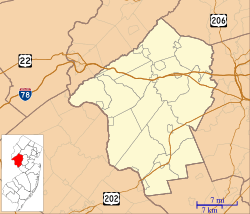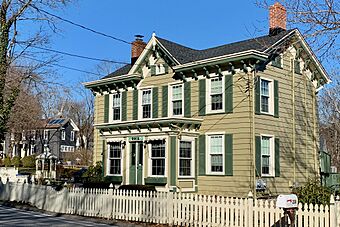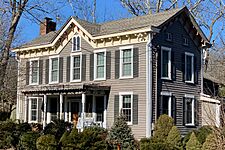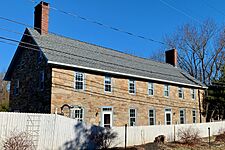Cokesbury, New Jersey facts for kids
Quick facts for kids
Cokesbury, New Jersey
|
|
|---|---|
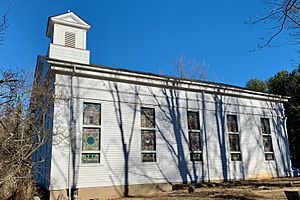
Cokesbury United Methodist Church
|
|
| Country | |
| State | |
| County | Hunterdon |
| Township | Clinton and Tewksbury |
| Established | 1754 |
| GNIS feature ID | 875541 |
Cokesbury, also called Cokesburg in the past, is a small community in New Jersey. It's located in Hunterdon County, right where Clinton and Tewksbury townships meet. It's known as an "unincorporated community," which means it's a place with a name but not its own separate local government.
The community was named after two important Methodist bishops, Coke and Asbury. Today, a special area called the Cokesbury Historic District is recognized for its historical importance. It was added to both state and national lists of historic places in 1997.
Contents
History of Cokesbury
Cokesbury has a long and interesting history. In 1754, an iron furnace was built here. This was a big deal because iron was very important back then.
Early Settlers and Buildings
One of the first known settlers in Cokesbury was Mindurt Farley. When he passed away in 1790, his farm went to his son, Joshua. Another person named Conrad Apgar built a tavern, which was like a hotel and restaurant. Sadly, this tavern was destroyed by a fire in April 1812.
Later, John Farley, who was Mindurt's other son, built a new hotel. By 1815, the Cokesbury church was finished, and the community was doing very well.
A Name Mix-Up
For a while, the post office kept misspelling the town's name as "Cokesburg" instead of "Cokesbury." This was a common mix-up!
Decline of the Town
In the 1880s, Cokesbury started to become smaller. The wheelwright shop, where people fixed wheels, and the hotel both closed down. In 1915, even the post office closed. The town continued to shrink, especially during World War II.
Cokesbury Historic District
The Cokesbury Historic District is a special area that covers about 50 acres. It was added to the National Register of Historic Places on July 17, 1997. This means it's recognized as an important place because of its architecture, businesses, religious history, and how the community was planned.
The district includes 44 buildings that help tell its story. It also has three structures and two sites that are important to its history.
Cokesbury United Methodist Church
One of the most notable buildings in the district is the Cokesbury United Methodist Church. The church you see today was built in 1851. It features a style called Greek Revival architecture, which means it looks like ancient Greek temples with columns and grand entrances.
Gallery


